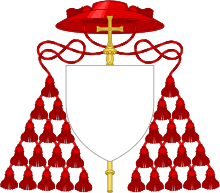Ciriaco María Sancha y Hervás
| His Eminence Blessed Ciriaco María Sancha y Hervás | |
|---|---|
| Archbishop of Toledo | |
| Church | Roman Catholic Church |
| Archdiocese | Toledo |
| Metropolis | Toledo |
| See | Toledo |
| Appointed | 24 March 1898 |
| Installed | 1898 |
| Term ended | 26 February 1909 |
| Predecessor | Antolín Monescillo y Viso |
| Successor | Gregorio Maria Aguirre y Garcia |
| Other posts |
|
| Orders | |
| Ordination |
27 June 1858 by Vicente Horcos San Martín |
| Consecration |
12 March 1876 by Juan Ignacio Moreno y Maisanove |
| Created Cardinal |
18 May 1894 by Pope Leo XIII |
| Rank | Cardinal-Priest |
| Personal details | |
| Birth name | Ciriaco María Sancha y Hervás |
| Born |
17 June 1833 Quintana del Pidio, Burgos, Kingdom of Spain |
| Died |
26 February 1909 (aged 75) Toldeo, Kingdom of Spain |
| Nationality | Spanish |
| Denomination | Roman Catholic |
| Previous post |
|
| Sainthood | |
| Feast day | 25 February |
| Venerated in | Roman Catholic Church |
| Title as Saint | Blessed |
| Beatified |
18 October 2009 Toledo, Spain by Cardinal Angelo Amato |
| Attributes |
|
| Styles of Ciriaco María Sancha y Hervás | |
|---|---|
 | |
| Reference style | His Eminence |
| Spoken style | Your Eminence |
| Informal style | Cardinal |
| See | Toledo |
Ciriaco María Sancha y Hervás (17 June 1833 – 26 February 1909) was a Cardinal of the Roman Catholic Church who served as the Archbishop of Toledo, Primate of Spain and the Patriarch of the West Indies.[1]
Biography
Ciriaco María Sancha y Hervás was born in Quintana del Pidio, Burgos province, Spain. He was educated at the University of Salamanca where he earned a licentiate in theology.
He was ordained to the priesthood on 27 June 1858. He served as the Lector of Philosophy in the Seminary of Osma. He then served in the archdiocese of Santiago de Cuba from 1862 until 1876 as chancellor-secretary and professor of moral theology in its seminary. He founded the Sisters of Charity on 5 August 1869.
While the archdiocese was vacant because of the death of the archbishop in 1868, the Spanish Republican government named, without the consent of the Holy See, Fr. Pedro Llorente Miguel as successor in 1873. Monsignor José María Orberá Carrión, who was vicar capitular, and Monsignor Sancha opposed the nomination and were jailed for their opposition. The schism ended in 1874 and both were then released.
Episcopate
He was appointed titular bishop of Areopolis and auxiliary bishop of Toledo by Pope Pius IX on 28 January 1876. He was transferred to the see of Ávila on 27 March 1882 and again to the see of Madrid on June 10, 1886. He was promoted to the metropolitan see of Valencia on 11 July 1892.
Cardinalate
He was created Cardinal-Priest of San Pietro in Montorio by Pope Leo XIII in the consistory of 18 May 1894. He was again transferred to the primatial and metropolitan see of Toledo on 24 March 1898 and on the same day was awarded the largely honorific title of Patriarch of the West Indies (which made him the titular head of all Spanish military bishops and chaplains). He participated in the conclave of 1903 that elected Pope St. Pius X. He died in 1909.[2]
Beatification
During an audience granted on 28 April 2006 to the Cardinal Prefect of the Congregation for the Causes of the Saints, then José Martins, Pope Benedict XVI authorized promulgation of the decree declaring the heroic virtues of Cardinal Sancha y Hervás, who could thus be referred to as Servant of God.
Then in a similar audience on 17 January 2009 granted to Archbishop Angelo Amato, Prefect of the Congregation for the Causes of Saints, Pope Benedict XVI approved the decree certifying the authenticity of a miracle attributed to the intercession of Cardinal Sancha. The beatification ceremony took place on 18 October 2009, at the metropolitan cathedral of Toledo.
References
- ↑ "Ciriaco María Cardinal Sancha y Hervás". Catholic-Hierarchy.
- ↑ Miranda, Salvador. "SANCHA Y HERVÁS, Ciriaco María". The Cardinals of the Holy Roman Church.
| Catholic Church titles | ||
|---|---|---|
| Preceded by Antolín Monescillo y Viso |
Archbishop of Toledo 24 March 1898–26 February 1909 |
Succeeded by Gregorio Maria Aguirre y Garcia |